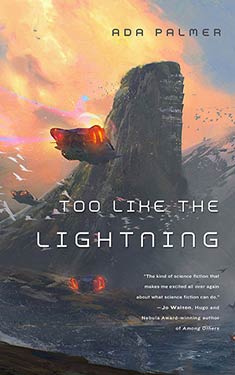Ada Palmer
Completed 6/4/2017 Reviewed 6/5/2017
1 star
Reading this book was one of the most unenjoyable
experiences of my literary life. It made
me feel stupid. It was so complex, I
could really only follow one of the plotlines.
The other plotlines lost me by about the hundredth page. I finished the book, hoping for some
clarity. Little came. I think the only reason I understood the book
as much as I did was because I read lots and lots of reviews for the book and I
looked for the cues in the text to reinforce the understanding I got from those
reviews. For my review, I’ll do the best
I can conveying the plot summaries.
 The setting is four hundred years in the future when there
are no more nations. People belong to
one of seven global organizations which provide a sort of citizenship, but can
live anywhere they want. There are no
gender references. Everyone is referred
to by they or them. However the narrator
refers to the characters as he or she depending on the behavioral
characteristics of the person, not the physical gender. For the most part, the gender references are
easy to follow.
The setting is four hundred years in the future when there
are no more nations. People belong to
one of seven global organizations which provide a sort of citizenship, but can
live anywhere they want. There are no
gender references. Everyone is referred
to by they or them. However the narrator
refers to the characters as he or she depending on the behavioral
characteristics of the person, not the physical gender. For the most part, the gender references are
easy to follow.
The main plot, I think, is that there is a thirteen year old
“boy”, Bridger, who has the ability to imbue life in inanimate objects, for
example a doll or plastic soldiers. He
is being kept and hidden by a powerful family unit, protecting him from the
outside world where they fear people will use Bridger’s powers for evil before
good. The story of the boy is being told
by Mycroft Canner, a criminal who has been sentenced to walk the earth doing
good things for others. He (I think
Mycroft is a he) spends a lot of time with this family. He provides a lot of support and holds
the trust of Bridger.
The narrator also conveys the other plot, which dominates
the book, but I think is supposed to be secondary to Bridger’s story. This plot is about the theft of a list of the
most influential people on Earth. This
list bears great influence and the theft is a society-shattering event. Considering this took up most of the book,
this is what lost me. This mystery is shrouded
in political intrigue, which I found completely boring.
The form of this book is that it is supposed to be written
as a piece of eighteenth century literature, including the narrator speaking to
the audience and the audience answering back.
This breaking of the fourth wall was sometimes interesting, but often
annoying. It made the following of the
complicated intrigue that much more difficult.
I also didn’t like the prose. Rather than helping the scene, I often found
it distracting and occasionally pompous.
At times it reminded me of Michael Chabon, looking for new similes to
use in his descriptions. Once or twice,
you stop and think, “Oh, that’s an interesting way to describe this” but then
after a while, you just feel like Palmer is simply showing off. For me, there’s a fine line between good and
obnoxious prose. It’s tough to describe
where that line is, but this crossed it.
There are a lot of characters in the book. Palmer spends a lot of time explaining what
they’re wearing. It was tough to
actually imagine the characters because you didn’t know if the character was
male or female, so the type of clothing worn often seemed irrelevant. In addition to the live characters, Palmer
brings in several philosophers of the eighteenth century including Voltaire,
Rousseau, and the Marquis de Sade. I
actually enjoyed some of the philosophy talk.
But even that got to be too much.
I often lost the point of bringing up the philosopher to begin
with.
I give this book one stars out of five. In my opinion, it is just too complicated a
story for me. Too many characters, too
much politics, too many plot lines, and a challenging form. And I don’t like being made to feel
stupid. I know a lot of people love it
or hate it, but apparently enough people loved it to get it a Hugo
nomination. I wouldn’t vote for it.
I like your review--I was starting to wonder if I was one of the only ones who disliked this book. I didn't manage to finish it (I actually only made it to about the hundredth page), and it sounds from your review like stopping was the right choice.
ReplyDeleteI actually liked the world-building, but I kept hoping there would be more to the plot than a magic child and a popularity contest. I also wasn't a huge fan of all the clothing description and Mycroft's obsession with gender.